
Steppenwolf was an American rock band that was prominent from 1968 to 1972. The group was formed in late 1967 in Los Angeles by lead singer John Kay, keyboardist Goldy McJohn, and drummer Jerry Edmonton, all formerly of the Canadian band the Sparrows. Guitarist Michael Monarch and bass guitarist Rushton Moreve were recruited via notices placed in Los Angeles-area record and musical instrument stores.

Nick St. Nicholas is a German bandleader, bass guitarist, singer and songwriter; best known for his partnership in Steppenwolf.
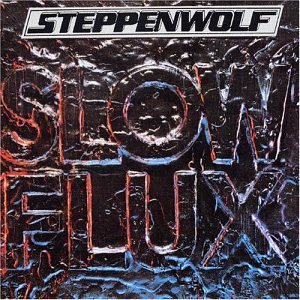
Slow Flux is the seventh studio album by Canadian-American rock band Steppenwolf. The album was released in August 1974, by Epic Records. In the US it was released on the Mums Records label, a short-lived CBS Records subsidiary. It was the first of three albums the band created after reforming in 1974 before they disbanded again in 1976. "Straight Shootin' Woman" was the last Steppenwolf song to chart on the Billboard magazine Top 40. The song "Children of the Night" notably posits that the hippie movement at this time had died, and president Richard Nixon is referred to as "the fool who believed that wrong is right".

Steppenwolf is the debut studio album by Canadian-American rock band Steppenwolf, released on January 29, 1968, on ABC Dunhill Records. It includes songs written by band members and songs written by others such as the Willie Dixon blues classic "Hoochie Coochie Man", retitled "Hootchie Kootchie Man".
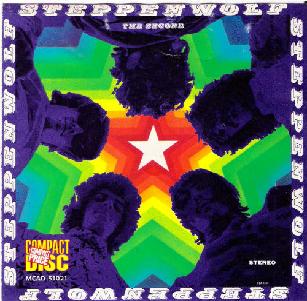
The Second is the second studio album by Canadian-American rock band Steppenwolf, released in October 1968 on ABC Dunhill Records. The album contains one of Steppenwolf's most famous songs, "Magic Carpet Ride". The background of the original ABC LP cover was a shiny "foil", in contrast to later LP issues and the modern CD sleeve.

At Your Birthday Party is the third studio album by Canadian-American rock band Steppenwolf. The album was released in March 1969, by ABC Dunhill Records.

Early Steppenwolf is a collection of live recordings by Steppenwolf when they were still known as "The Sparrow" [nee: "The Sparrows"]. It was released in July 1969 on the ABC Dunhill Records label.

Monster is the fourth studio album by Canadian-American rock band Steppenwolf. The album was released in November 1969, by ABC Dunhill Records. It was their first LP with new lead guitarist Larry Byrom instead of Michael Monarch. The album was Steppenwolf's most political album, making references to important issues at the time, such as the Vietnam War.

Steppenwolf 7 is the fifth studio album by Canadian-American rock band Steppenwolf. The album was released in November 1970, by Dunhill Records. It is the first Steppenwolf album with new bass player George Biondo. The album’s numerical title reflects the fact that it was the band’s seventh album release for ABC/Dunhill records . While the album featured Steppenwolf's trademark rock and roll sounds, none of the songs were able to make the top 40. The album featured a cover of Hoyt Axton's "Snowblind Friend", their second cover of one of his antidrug songs. Along with "Who Needs Ya", it was one of two singles from the album which made the charts, but fell short of the top 40. The album track "Renegade" is autobiographical for lead vocalist John Kay, recounting his flight with his mother from the Soviet occupation zone to the West in 1948. The intro to "Earschplittenloudenboomer" is spoken by Kay partially in German.
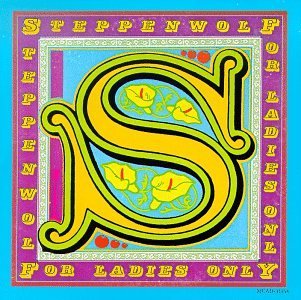
For Ladies Only is the sixth studio album by Canadian-American rock band Steppenwolf. The album was released in November 1971, by Dunhill Records. It is a political concept album mainly about feminism but with several more conventional songs about romance as well, both unusual themes for Steppenwolf. Some critics saw the album as sexist, citing the lyrics of the songs and a photo of a car shaped like a penis alongside the Hollywood Walk of Fame in the gatefold. The album saw the band hinting toward the progressive rock movement that was popular at the time with more complex arrangements and sophisticated keyboard playing, particularly on the title track. Like their previous album, it was accompanied by two minor hit singles which fell just short of the Top 40.

Hour of the Wolf is the eighth studio album by Canadian-American rock band Steppenwolf. The album was released in September 1975, by Epic Records. Andy Chapin replaced long time keyboardist Goldy McJohn on this album.

Skullduggery is the ninth studio album by Canadian-American rock band Steppenwolf. The album was released in May 1976, by Epic Records. It was the third of four released by Epic Records, and the last to feature keyboardist Wayne Cook, who left to join Player in 1977. It is the also the last album to be released simply under the Steppenwolf name before the group rebranded themselves as John Kay & Steppenwolf.

Steppenwolf Live is primarily a collection of recordings from a single concert early in 1970 at the Santa Monica Civic Auditorium by Steppenwolf staged in support of their 1969 album Monster. Released in April 1970 by Dunhill Records, it contains Steppenwolf's well-known hits: "Born to Be Wild", "Magic Carpet Ride" and "The Pusher", as well as most of the songs from Monster, including three previous top 40 hits, as well as the top 40 hit "Hey Lawdy Mama" from this album.

16 Greatest Hits is a compilation album by Steppenwolf, released in 1973. It features some of their most famous songs, including "Born to Be Wild", "The Pusher", and "Magic Carpet Ride", and "Hey Lawdy Mama." The album consisted of the 11 tracks from the previous Gold: Their Great Hits album, in the same order as on the two sides of that earlier album, with the addition of the final two tracks on side 1, and the final three tracks on side 2.

Gold: Their Great Hits is a greatest hits album released by the Canadian-American hard rock band Steppenwolf. The album, released in 1971, charted at #24 on the Billboard Pop Albums charts and was certified "gold" by the RIAA on April 12, 1971. Initial pressings of the album came in a gatefold sleeve, with a detachable poster of the band.

Wolftracks is an album by John Kay and Steppenwolf, released in 1982. It was originally released only in Canada and Australia. The album was the first new studio album in six years for John Kay, featuring a new line-up of Steppenwolf and Kay renaming the group accordingly.
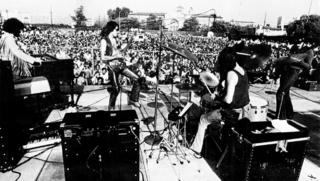
The discography of Steppenwolf, a Canadian-American Hard rock band, consists of 13 studio albums, 14 compilation albums, 5 41 singles, and three music videos. The band was formed in 1967 after some members of The Sparrows split. Group members included John Kay, Michael Monarch, Goldy McJohn, Rushton Moreve and Jerry Edmonton. Their first album, Steppenwolf, was released in 1968, which sold well and reached 6 on Billboard. That same year, Steppenwolf covered "The Pusher". The song was later used in Easy Rider. The album's most successful single was "Born to Be Wild", which reached No. 2 on the Billboard. At the time of the release of second album, The Second, the band's bassist Rushton Moreve had a dispute with band leader John Kay, and was eventually replaced with Nick St. Nicholas. The album's single was "Magic Carpet Ride" which reached number 3 on Billboard.
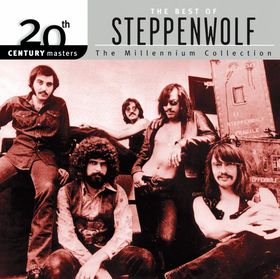
20th Century Masters – The Millennium Collection: The Best of Steppenwolf, released by Universal Music as part of their 20th Century Masters – The Millennium Collection series, is a CD that collects material by Steppenwolf from 1968 to 1971. The compilation focuses on Steppenwolf’s Dunhill recordings, with the bulk of material coming from their Steppenwolf through At Your Birthday Party albums. While generally regarded as a solid representation of Steppenwolf’s early-period proto-metal work from the 1960s, there were no new tracks or previously unreleased songs included. It includes liner notes by Joseph Laredo and was digitally remastered by Erick Labson. It was certified Gold by the Recording Industry Association of America on October 29, 2004, the first output by Steppenwolf to earn such a designation since 16 Greatest Hits went gold on April 12, 1971.

Forgotten Songs and Unsung Heroes is the first solo album by German-Canadian musician John Kay. It was released on Dunhill Records in 1972.



















